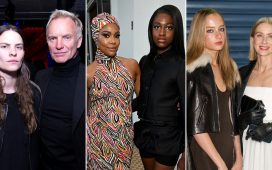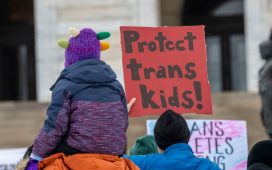Transitioning was my decision to be free. To choose life — Eva.
Despite the multitude of wonders and nuanced personal freedoms transitioning can present in one’s life, this is not what we typically see when Black trans people are represented in the media. Popular narratives often depict Black trans subjects as living at two ends of a spectrum: Either we struggle to survive or we magically thrive. Our names become trending hashtags due to brutal and frequent murders, or we somehow beat out all odds and do the impossible, achieving fame and acclaim.
Black trans life is much more complex than that. The epidemic of Black trans murders should not be the general public’s introduction to who we are. We are more than death. We are not a tragic trope, popular hashtag or concept to theorize over. We are real.
Black trans people are everywhere. We exist at every intersection of life, every level of employment, and in every industry. Our lives are not monolithic, but so many of our portrayals are. These representations lead cis and nonblack people to form misconceptions of our varied yet shared realities. Only recently has the general public even taken interest in our lives beyond our deaths, in no small part due to the success of films and shows like FX’s Pose and the ever-growing fascination around the cult classic Paris is Burning. These offerings, however, are just the tip of the iceberg. The world is just barely beginning to take time to learn who we are and make space for us.
These past few months have shown considerable progress in the movement for Black lives, but far too often, the movement focuses on Black cis men, and only sometimes spotlights the Black cis and trans women often at the forefront of our most resonant calls for justice. This example of cissexism eradicates the existence of Black trans people from the public eye. On the rare occasion that our deaths are honored publicly they are often transmuted into clickbait and trauma porn for people outside of our community. Though our names have slowly entered mainstream conversations about the Black Lives Matter movement, a bit of progress that uplifts Black trans activists’ and organizers’ decades worth of work, the end goal must not be tokenization disguised as inclusion. Our goal is liberation.
Black trans people are more than capable of emancipating ourselves. We do it every day simply by existing. For self-proclaimed allies, it is time to ask some questions: Why are Black trans people only now receiving so much attention from myself and others like me? Is my concern for their livelihood conditional upon their appearance or perceived class status? Why does so much of this recent momentum revolve around their deaths? Will my newfound allyship go beyond Pride season and sharing obituaries on social media? Where is the outcry for Black trans people still walking this Earth? And lastly, what do I actually know about Black trans people?
Everyone should be concerned about the violence we face, but that same level of attention must be given to sustaining our lives. To honor us means not only confronting how you personally uphold racist and transphobic systems. It also means listening to what we have to say. The value of our lives is unquantifiable. Our stories need to be told for us and by us. We are more than a statistic. We are more than a tragic trope. We are more than a trend of the summer.
We are alive.
I am alive.
I am a proud Black trans woman. I was born and raised in South City St. Louis and East St. Louis, Illinois. My people come from Tennessee and Arkansas. I come from a family still learning how to love a girl like me. I live in a country still grappling with the existence of a girl like me. I live in a world still making space for a girl like me.
Growing up in the Midwest, I seldom saw examples of what my future could hold. To those in my surrounding environments, I was a source of confusion. I was Black, queer, effeminate, and quite unrelenting in my self-expression and veracity. I was a threat to these communities’ bourgeois oasis, their all-white American dream. Navigating an environment filled with the stringent bureaucracy of school administrators and unyielding bigotry from bullies taught me a lot about survival.
That meant realizing that I am not a problem, but I have been placed in a world that has a problem with me. Like many other Black trans people, I learned early on how to wade through the murky waters of a system that was not built for me. Later, I would learn to intentionally interrupt those same spaces.
Everything in the world as it currently is was created to silence the voices of people like me. This column serves to counteract these structures. Here, as we feature Black trans folks from across the country, our voices will be heard. Our stories will be told. Changemakers and everyday folks — from artists and scholars to cultural workers and community leaders — this series of profiles will share the limitless diversity of our lives, the various nuances of our experiences, and the unique challenges we face. So too, it will be a place to celebrate our beauty, our joy, our freedom, and our victories, both large and small.
I invite you to join us on this journey. Together, we can collectively turn the tide on tired tales and center stories not yet told.
Let’s get into it!
Eva Reign, a former Assistant Editor at them. is a Black trans artist, writer, and actor from St. Louis, Missouri now living in Brooklyn. She has appeared in works shown at the Brooklyn Museum and the Modern Museum of Art. Eva is currently a 2020-2021 Film Fellow with Queer|Art.
Get the best of what’s queer. Sign up for our weekly newsletter here.








